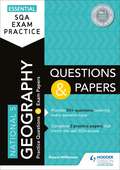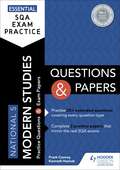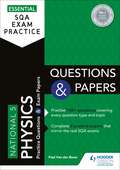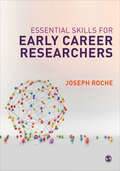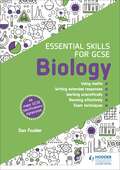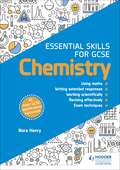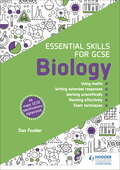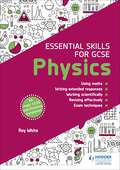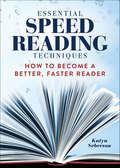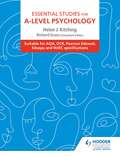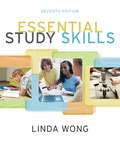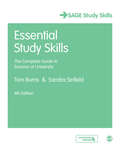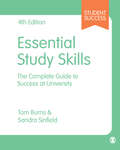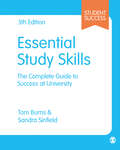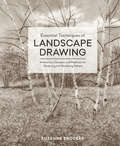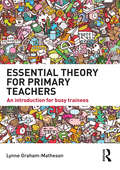- Table View
- List View
Essential SQA Exam Practice: National 5 Geography Questions and Papers
by Sheena WilliamsonExam board: SQALevel: National 5Subject: GeographyFirst teaching: September 2017First exam: Summer 2018Practice makes permanent. Feel confident and prepared for the SQA National 5 Geography exam with this two-in-one book, containing practice questions for every question type and the most popular topics, plus two full practice papers.- Choose to revise by question type or topic: A simple grid enables you to pick particular question styles or course areas that you want to focus on, with answers provided at the back of the book- Understand what the examiner is looking for: Clear guidance on how to answer each question type is followed by plenty of questions so you can put the advice into practice, building essential exam skills- Remember more in your exam: Repeated and extended practice will give you a secure knowledge of the key areas of the course (physical environments; human environments; global issues)- Familiarise yourself with the exam paper: Both practice papers mirror the language and layout of the real SQA papers; complete them in timed, exam-style conditions to increase your confidence before the exams- Find out how to achieve a better grade: Answers to the practice papers have commentaries for each question, with tips on writing successful answers and avoiding common mistakesFully up to date with SQA's requirementsThe questions, mark schemes and guidance in this practice book match the requirements of the revised SQA National 5 Geography specification for examination from 2018 onwards.This book covers the following topics:Section 1: Physical Environments:- Landscape Types- WeatherSection 2: Human Environments:- World Population Distribution and Change- Issues in Changing Urban and Rural LandscapesSection 3: Global Issues:- Climate Change- Natural Regions- Environmental Hazards- Trade and Globalisation- Tourism- Health
Essential SQA Exam Practice: National 5 Modern Studies Questions and Papers
by Frank Cooney Kenneth HannahExam board: SQALevel: National 5Subject: Modern StudiesFirst teaching: September 2017First exam: Summer 2018Practice makes permanent. Feel confident and prepared for the SQA National 5 Modern Studies exam with this two-in-one book, containing practice questions for every question type and topic, plus two full practice papers.- Choose to revise by question type or topic: A simple grid enables you to pick particular question styles or course areas that you want to focus on, with answers provided at the back of the book- Understand what the examiner is looking for: Clear guidance on how to answer each question type is followed by plenty of questions so you can put the advice into practice, building essential exam skills- Remember more in your exam: Repeated and extended practice will give you a secure knowledge of the key areas of the course (democracy in Scotland and the United Kingdom; social issues in the United Kingdom; international issues)- Familiarise yourself with the exam paper: Both practice papers mirror the language and layout of the real SQA papers; complete them in timed, exam-style conditions to increase your confidence before the exams- Find out how to achieve a better grade: Answers to the practice papers have commentaries for each question, with tips on writing successful answers and avoiding common mistakesFully up to date with SQA's requirementsThe questions, mark schemes and guidance in this practice book match the requirements of the revised SQA National 5 Modern Studies specification for examination from 2018 onwards.
Essential SQA Exam Practice: National 5 Physics Questions and Papers
by Paul Van der BoonExam board: SQALevel: National 5Subject: PhysicsFirst teaching: September 2017First exam: Summer 2018Practice makes permanent. Feel confident and prepared for the SQA National 5 Physics exam with this two-in-one book, containing practice questions for every question type and topic, plus two full practice papers - all written by an experienced examiner.- Choose to revise by question type or topic: A simple grid enables you to pick particular question styles or course areas that you want to focus on, with answers provided at the back of the book- Understand what the examiner is looking for: Clear guidance on how to answer each question type is followed by plenty of questions so you can put the advice into practice, building essential exam skills- Remember more in your exam: Repeated and extended practice will give you a secure knowledge of the key areas of the course (dynamics; space; electricity; properties of matter; waves; radiation)- Familiarise yourself with the exam paper: Both practice papers mirror the language and layout of the real SQA papers; complete them in timed, exam-style conditions to increase your confidence before the exams- Find out how to achieve a better grade: Answers to the practice papers have commentaries for each question, with tips on writing successful answers and avoiding common mistakesFully up to date with SQA's requirementsThe questions, mark schemes and guidance in this practice book match the requirements of the revised SQA National 5 Physics specification for examination from 2018 onwards.
Essential Skills for Early Career Researchers
by Joseph RocheThe perfect companion to support your development of the academic and professional skills you need as an early career researcher to help you thrive in academia. This practical book offers guidance on the essential skills you need to succeed as an academic researcher. · Work out how to thrive in academia while protecting your own wellbeing · Learn how to develop discipline and structure in your academic writing · Navigate the nuances of research funding applications · Understand how to build professional development into your daily work · Take a smart perspective on career progression Designed to work across academic disciplines, each chapter includes lessons learned from published literature as well as perspectives from recent early career researchers to provide you with detailed insight applicable to diverse academic contexts. This book is accompanied by 30+ online resources and sample templates, including downloadable and editable research proposals, publication plans, lecture slides, resumes and cover letters. Joseph Roche is a researcher and lecturer at Trinity College Dublin.
Essential Skills for Early Career Researchers
by Joseph RocheThe perfect companion to support your development of the academic and professional skills you need as an early career researcher to help you thrive in academia. This practical book offers guidance on the essential skills you need to succeed as an academic researcher. · Work out how to thrive in academia while protecting your own wellbeing · Learn how to develop discipline and structure in your academic writing · Navigate the nuances of research funding applications · Understand how to build professional development into your daily work · Take a smart perspective on career progression Designed to work across academic disciplines, each chapter includes lessons learned from published literature as well as perspectives from recent early career researchers to provide you with detailed insight applicable to diverse academic contexts. This book is accompanied by 30+ online resources and sample templates, including downloadable and editable research proposals, publication plans, lecture slides, resumes and cover letters. Joseph Roche is a researcher and lecturer at Trinity College Dublin.
Essential Skills for GCSE Biology
by Dan FoulderBuild essential maths, literacy and working scientifically skills to boost marks in GCSE Biology and ensure that students reach their full potential.Suitable for all specifications, this skills book provides additional support and will help to:- Sharpen mathematical skills with plenty of practice questions and coverage of all the maths techniques needed for the exams.- Improve literacy skills with tips on how to write longer answers, plus peer-assessment marking activities.- Develop the working scientifically skills needed to plan, carry out and evaluate practical experiments, in order to secure the maximum number of marks.- Build confidence by putting skills into practice; using our three-step formula students will progress from worked examples to guided questions and exam-style questions, with fully-worked solutions in the book.- Raise performance in the exams with practical advice on how to revise effectively and tips on understanding the questions, command words and assessment objectives.
Essential Skills for GCSE Biology
by Dan FoulderBuild essential maths, literacy and working scientifically skills to boost marks in GCSE Biology and ensure that students reach their full potential.Suitable for all specifications, this skills book provides additional support and will help to:- Sharpen mathematical skills with plenty of practice questions and coverage of all the maths techniques needed for the exams.- Improve literacy skills with tips on how to write longer answers, plus peer-assessment marking activities.- Develop the working scientifically skills needed to plan, carry out and evaluate practical experiments, in order to secure the maximum number of marks.- Build confidence by putting skills into practice; using our three-step formula students will progress from worked examples to guided questions and exam-style questions, with fully-worked solutions in the book.- Raise performance in the exams with practical advice on how to revise effectively and tips on understanding the questions, command words and assessment objectives.
Essential Skills for GCSE Chemistry
by Nora HenryBuild essential maths, literacy and working scientifically skills to boost marks in GCSE Chemistry and ensure that students reach their full potential.Suitable for all specifications, this skills book provides additional support and will help to:Sharpen mathematical skills with plenty of practice questions and coverage of all the maths techniques needed for the exams.Improve literacy skills with tips on how to write longer answers, plus peer-assessment marking activities.Develop the working scientifically skills needed to plan, carry out and evaluate practical experiments, in order to secure the maximum number of marks.Build confidence by putting skills into practice; using our three-step formula students will progress from worked examples to guided questions and exam-style questions, with fully-worked solutions in the book.Raise performance in the exams with practical advice on how to revise effectively and tips on understanding the questions, command words and assessment objectives.
Essential Skills for GCSE Chemistry
by Nora HenryBuild essential maths, literacy and working scientifically skills to boost marks in GCSE Chemistry and ensure that students reach their full potential.Suitable for all specifications, this skills book provides additional support and will help to:- Sharpen mathematical skills with plenty of practice questions and coverage of all the maths techniques needed for the exams.- Improve literacy skills with tips on how to write longer answers, plus peer-assessment marking activities.- Develop the working scientifically skills needed to plan, carry out and evaluate practical experiments, in order to secure the maximum number of marks.- Build confidence by putting skills into practice; using our three-step formula students will progress from worked examples to guided questions and exam-style questions, with fully-worked solutions in the book.- Raise performance in the exams with practical advice on how to revise effectively and tips on understanding the questions, command words and assessment objectives.
Essential Skills for GCSE Combined Science
by Nora Henry Dan Foulder Roy WhiteBuild essential maths, literacy and working scientifically skills to boost marks in GCSE Biology and ensure that students reach their full potential.Suitable for all specifications, this skills book provides additional support and will help to:- Sharpen mathematical skills with plenty of practice questions and coverage of all the maths techniques needed for the exams.- Improve literacy skills with tips on how to write longer answers, plus peer-assessment marking activities.- Develop the working scientifically skills needed to plan, carry out and evaluate practical experiments, in order to secure the maximum number of marks.- Build confidence by putting skills into practice; using our three-step formula students will progress from worked examples to guided questions and exam-style questions, with fully-worked solutions in the book.- Raise performance in the exams with practical advice on how to revise effectively and tips on understanding the questions, command words and assessment objectives.
Essential Skills for GCSE Combined Science
by Nora Henry Dan Foulder Roy WhiteBuild essential maths, literacy and working scientifically skills to boost marks in GCSE Biology and ensure that students reach their full potential.Suitable for all specifications, this skills book provides additional support and will help to:- Sharpen mathematical skills with plenty of practice questions and coverage of all the maths techniques needed for the exams.- Improve literacy skills with tips on how to write longer answers, plus peer-assessment marking activities.- Develop the working scientifically skills needed to plan, carry out and evaluate practical experiments, in order to secure the maximum number of marks.- Build confidence by putting skills into practice; using our three-step formula students will progress from worked examples to guided questions and exam-style questions, with fully-worked solutions in the book.- Raise performance in the exams with practical advice on how to revise effectively and tips on understanding the questions, command words and assessment objectives.
Essential Skills for GCSE Physics
by Roy WhiteBuild essential maths, literacy and working scientifically skills to boost marks in GCSE Biology and ensure that students reach their full potential.Suitable for all specifications, this skills book provides additional support and will help to:- Sharpen mathematical skills with plenty of practice questions and coverage of all the maths techniques needed for the exams.- Improve literacy skills with tips on how to write longer answers, plus peer-assessment marking activities.- Develop the working scientifically skills needed to plan, carry out and evaluate practical experiments, in order to secure the maximum number of marks.- Build confidence by putting skills into practice; using our three-step formula students will progress from worked examples to guided questions and exam-style questions, with fully-worked solutions in the book.- Raise performance in the exams with practical advice on how to revise effectively and tips on understanding the questions, command words and assessment objectives.
Essential Skills for GCSE Physics
by Roy WhiteBuild essential maths, literacy and working scientifically skills to boost marks in GCSE Biology and ensure that students reach their full potential.Suitable for all specifications, this skills book provides additional support and will help to:- Sharpen mathematical skills with plenty of practice questions and coverage of all the maths techniques needed for the exams.- Improve literacy skills with tips on how to write longer answers, plus peer-assessment marking activities.- Develop the working scientifically skills needed to plan, carry out and evaluate practical experiments, in order to secure the maximum number of marks.- Build confidence by putting skills into practice; using our three-step formula students will progress from worked examples to guided questions and exam-style questions, with fully-worked solutions in the book.- Raise performance in the exams with practical advice on how to revise effectively and tips on understanding the questions, command words and assessment objectives.
Essential Skills for Managers of Child-Centred Settings (Excellence In Childcare Ser.)
by Shelly Newstead Emma Isles-BuckManagers in child-centred settings need to be able to draw on a wide range of personal and professional skills to ensure that they are providing the best possible service. Now in its third edition, Essential Skills for Managers of Child-Centred Settings looks at how you can develop the key leadership skills needed to manage people to achieve excellent settings for children. The authors outline ten ‘essential skills’ for leading and supporting those around you in your child-centred settings and offer sound advice so you can build your personal and professional skills and become a confident and assertive manager. With a balance of both accessible theory and practical application from a wide range of settings, this book explains management theory and will help you to develop the skills to: ● become a confident leader ● set clear aims and objectives for your setting ● manage your time effectively ● make decisions and implement change ● build and develop a team ● reflect on and develop practice ● deal with difficult situations and people. This book also contains case studies and ‘real-life’ scenarios from managers undertaking training with the authors which will ensure you provide an excellent service in your setting. No manager or leader should be without this user-friendly guide!
Essential Speed Reading Techniques: How to Become a Better, Faster Reader
by Katya SebersonFly through books with this essential speed reading guide.Faster reading is possible without sacrificing understanding—and this handbook will get you up to speed. Learn the most effective speed reading techniques for your personal strengths and challenges, and make visible progress through a series of engaging exercises.Choose from a variety of strategies and practices proven to advance speed and improve reading comprehension. The integrated exercises help develop your skills, allowing you to read quickly—and still enjoy every word. Whether you're reading an entertaining novel or a challenging textbook, this speed reading guide will help you sail right through.In Essential Speed Reading Techniques, you'll find:Achievable goals—Improve your speed by setting realistic goals based on your own individual baseline.Track your improvement—Assess your progress with self-tests for knowledge retention, smooth eye movement, and more.Tips and tricks—Discover speed reading strategies to minimize rereading, focus your attention, and reduce eyestrain from screens.With the personalized strategies in Essential Speed Reading Techniques, boosting your speed and reading comprehension will be a breeze.
Essential Studies for A-Level Psychology
by Helen J. KitchingUnderstand and evaluate 42 classic and contemporary psychological studies, including Milgram and Rutter, with this essential guide.Each study begins with a summary of the aims and procedure, followed by the findings, conclusion and evaluation, and ends with 'check your knowledge' questions that help to prepare students for assessment.- Build knowledge with easily accessible summaries of each study presented in a table, making it quick and easy to recap and revise- Develop analysis, interpretation and evaluation skills with examples, insights and practice questions that help students to form reasoned conclusions- Learn to apply knowledge and think synoptically with links to other studies; these also demonstrate learning beyond the curriculum in line with Ofsted requirements- Benefit from the guidance of bestselling Psychology author Richard Gross, with helpful insights at the end of each chapter- Cover every research/core study for the AQA, OCR, Pearson Edexcel, WJEC and Eduqas specifications
Essential Studies for A-Level Psychology
by Helen J. KitchingUnderstand and evaluate 42 classic and contemporary psychological studies, including Milgram and Rutter, with this essential guide.Each study begins with a summary of the aims and procedure, followed by the findings, conclusion and evaluation, and ends with 'check your knowledge' questions that help to prepare students for assessment.- Build knowledge with easily accessible summaries of each study presented in a table, making it quick and easy to recap and revise- Develop analysis, interpretation and evaluation skills with examples, insights and practice questions that help students to form reasoned conclusions- Learn to apply knowledge and think synoptically with links to other studies; these also demonstrate learning beyond the curriculum in line with Ofsted requirements- Benefit from the guidance of bestselling Psychology author Richard Gross, with helpful insights at the end of each chapter- Cover every research/core study for the AQA, OCR, Pearson Edexcel, WJEC and Eduqas specifications
Essential Study Skills (7th Edition)
by Linda WongFor students who need to develop the study skills required to successfully complete their college education--whether they attend a two- or four-year college or they are adult learners--ESSENTIAL STUDY SKILLS, 7th Edition, is their guide to success. Featuring the essential learning strategies for becoming a better student, this book helps students learn how to prepare for class, develop textbook reading strategies, use effective note-taking techniques, strengthen their test-taking skills, and carry their skills forward. ESSENTIAL STUDY SKILLS, 7th Edition, adapts to any learning style and offers a step-by-step approach and numerous opportunities for practice throughout the textbook and accompanying website. The fresh four-color design and streamlined look engage students and emphasize the essentials.
Essential Study Skills: The Complete Guide to Success at University (SAGE Study Skills Series)
by Tom Burns Sandra SinfieldLecturers, request your electronic inspection copy here Do you want to do better at university? Packed with study tips and handy activities, Essential Study Skills is a proven guide that shows you step-by-step how to study effectively and make the best of your time at university - whatever level you're at. Whether you are going to university straight from school, a mature student, or an overseas student studying in the UK for the first time, you'll find out how to: Sail through those tricky first weeks Get the most out of lectures by understanding how you learn Learn techniques for academic writing and research Stay cool and cope with stress Pass exams with flying colours Plan your career after graduation. Don't miss in this edition... Even more tips and advice on learning methods, online learning and developing job skills - ensuring success throughout your course Additional case studies and student tips to help you apply the skills you need A companion website packed with toolkits and resources, to help you study smarter. ‘An outstanding book which enables learners to actively identify, reflect and develop their ‘skills’ to enable them to succeed as life-long learners. The authors present the ‘how to’ alongside the ‘what’ of study skills to enable continuous personal development, in an accessible style.’ - Di Turgoose, Senior Lecturer, Member of the Association for Learning and Development in Higher Education SAGE Study Skills are essential study guides for students of all levels. From how to write great essays and succeeding at university, to writing your undergraduate dissertation and doing postgraduate research, SAGE Study Skills help you get the best from your time at university. Visit the SAGE Study Skills hub for tips, quizzes and videos on study success!
Essential Study Skills: The Complete Guide to Success at University (SAGE Study Skills Series)
by Tom Burns Sandra SinfieldDo you want to do better at university?<P> Whether you're a student wanting to improve their study skills or a lecturer who wants to give their students a helping hand with their work, this book is for you.<P> Essential Study Skills is a proven guide for every student wanting to achieve success at university.<P> Packed with study tips and handy activities, this study skills handbook shows you step-by-step how to study effectively and make the best of your time - whatever level you're at.<P> Whether you are going to university straight from school, a mature student, or an overseas student studying in the UK for the first time, you'll find out how to:<P> * Sail through those tricky first weeks<P> * Get the most out of lectures by understanding how you learn<P> * Learn techniques for academic writing and research<P> * Pass exams with flying colours<P> * Stay cool and cope with stress.<P> Practical and interactive, this edition features three brand new chapters to arm you with even more essential skills including how to produce a dissertation, planning your career and focussing on building relationships with lecturers and other students to help you get ahead.<P> Also launching with this new edition is an improved and expanded companion website. Don't miss the extensive range of guidance and resources for both students and tutors, including downloadable templates, practice exercises and other tools for students to use in both their preparation and their actual work.
Essential Study Skills: The Complete Guide to Success at University (Student Success)
by Tom Burns Sandra Sinfield"If you′re looking to be that top student, this book is a must!" – five-star student review Packed with study tips, activities, templates and quotes from students, this is your essential guide to university, showing you step-by-step how to study effectively and make the best of your time at university. Whether you are going to university straight from school, as a mature, or as an overseas student studying in the UK for the first time, you′ll find out how to: Sail through those tricky first weeks Get the most out of lectures by understanding how you learn Learn techniques for academic writing and research Effectively work with others in groups, seminars and workshops Write assignments and pass exams with flying colours Build your CV and plan your next steps after graduation. New to this edition is content on how to thrive at university, learn and research digitally, and how to develop your employability skills. Student Success is a series of essential guides for students of all levels. From how to think critically and write great essays to boosting your employability and managing your wellbeing, the Student Success series helps you study smarter and get the best from your time at university.
Essential Study Skills: The Complete Guide to Success at University (Student Success)
by Tom Burns Sandra Sinfield"If you′re looking to be that top student, this book is a must!" – five-star student review Packed with study tips, activities, templates and quotes from students, this is your essential guide to university, showing you step-by-step how to study effectively and make the best of your time at university. Whether you are going to university straight from school, as a mature, or as an overseas student studying in the UK for the first time, you′ll find out how to: Sail through those tricky first weeks Get the most out of lectures by understanding how you learn Learn techniques for academic writing and research Effectively work with others in groups, seminars and workshops Write assignments and pass exams with flying colours Build your CV and plan your next steps after graduation. New to this edition is content on how to thrive at university, learn and research digitally, and how to develop your employability skills. Student Success is a series of essential guides for students of all levels. From how to think critically and write great essays to boosting your employability and managing your wellbeing, the Student Success series helps you study smarter and get the best from your time at university.
Essential Study Strategies
by Walter PaukThis unique, concise book uses a conversational tone to encourage readers and students to immediately improve their learning experience. It provides inspiration and incentive for studying and achieving an education--along with easy-to-understand skills and strategies to become more effective in school. Strategies include setting goals, time management, concentration, and memory. Study skills coverage includes the Cornell Note taking System and other formats, test taking, vocabulary building, classroom lectures, textbook assignments, and research papers. Two learning and study strategies inventories are provided to give meaningful information about the strengths and weaknesses of the student's study patterns in ten areas directly related to academic success. For students who want to improve their study skills and the quality of their education.
Essential Techniques of Landscape Drawing: Master the Concepts and Methods for Observing and Rendering Nature
by Suzanne BrookerThis beginner's guide to drawing in graphite pencil uses step-by-step exercises to teach fundamental methods for rendering all aspects of the natural landscape, with additional lessons on using charcoal, colored pencil, pastel, and other media.Following in the footsteps of author, artist, and art instructor Suzanne Brooker's previous title The Elements of Landscape Oil Painting, this book pairs the most universally-pursued topic for artists (drawing) with the popular subject matter of the natural landscape. Brooker breaks down landscapes into their various elements--including the earth, water, air, and trees--to convey how the fundamentals of drawing are applied to capture each aspect. Using the graphite pencil as her baseline instrument, Brooker provides you with step-by-step lessons that help you improve your rendering skills and re-create the beauty of the world outdoors. Examples from art history and contemporary masters supplement these lessons. The end result is a drawing instruction book that provides artists with everything they need to render landscapes no matter their skill level.
Essential Theory for Primary Teachers: An introduction for busy trainees
by Lynne Graham-MathesonEssential Theory for Primary Teachers is a succinct, accessible introduction to the key theories, concepts and policies that have shaped primary education as we know it, and underpin our practice in the classroom. Written with the ever busy training and practising teacher in mind, this straightforward guide offers the foundations for a solid understanding of how we teach and learn effectively, and how we develop as professionals. Together with key further reading highlights, a glossary of acronyms, and an at-a-glance timeline of the major events, acts and policies in education it explains core topics: A short history of the education system What is education for? Inequality and education Special educational needs and inclusion Child development How children learn Theories of motivation Behaviour for learning Assessment for learning Understanding and using research evidence Undertaking your own action research project Essential Theory for Primary Teachers brings together in one volume theory and knowledge that stands the test of time, it guides you through what others have said about them and will help you relate them to your own practice. A much-needed source of guidance for training and newly-qualified-teachers, it will support you as you develop the skills you need to teach confidently and help your learners succeed.
